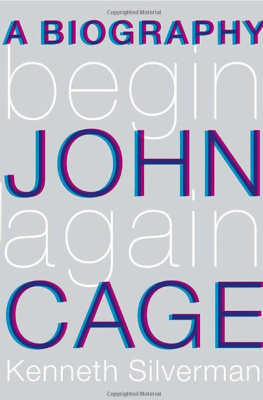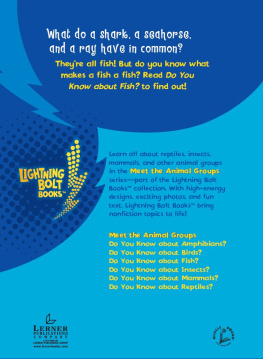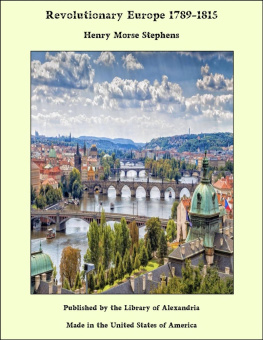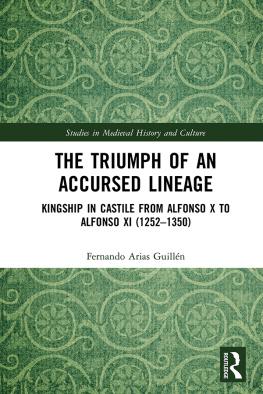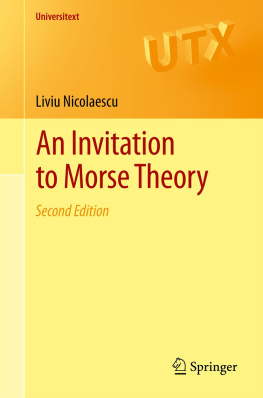Kenneth Silverman - Lightning Man: The Accursed Life Of Samuel F. B. Morse
Here you can read online Kenneth Silverman - Lightning Man: The Accursed Life Of Samuel F. B. Morse full text of the book (entire story) in english for free. Download pdf and epub, get meaning, cover and reviews about this ebook. year: 2003, publisher: Alfred A. Knopf, genre: Detective and thriller. Description of the work, (preface) as well as reviews are available. Best literature library LitArk.com created for fans of good reading and offers a wide selection of genres:
Romance novel
Science fiction
Adventure
Detective
Science
History
Home and family
Prose
Art
Politics
Computer
Non-fiction
Religion
Business
Children
Humor
Choose a favorite category and find really read worthwhile books. Enjoy immersion in the world of imagination, feel the emotions of the characters or learn something new for yourself, make an fascinating discovery.

- Book:Lightning Man: The Accursed Life Of Samuel F. B. Morse
- Author:
- Publisher:Alfred A. Knopf
- Genre:
- Year:2003
- Rating:4 / 5
- Favourites:Add to favourites
- Your mark:
- 80
- 1
- 2
- 3
- 4
- 5
Lightning Man: The Accursed Life Of Samuel F. B. Morse: summary, description and annotation
We offer to read an annotation, description, summary or preface (depends on what the author of the book "Lightning Man: The Accursed Life Of Samuel F. B. Morse" wrote himself). If you haven't found the necessary information about the book — write in the comments, we will try to find it.
Lightning Man: The Accursed Life Of Samuel F. B. Morse — read online for free the complete book (whole text) full work
Below is the text of the book, divided by pages. System saving the place of the last page read, allows you to conveniently read the book "Lightning Man: The Accursed Life Of Samuel F. B. Morse" online for free, without having to search again every time where you left off. Put a bookmark, and you can go to the page where you finished reading at any time.
Font size:
Interval:
Bookmark:
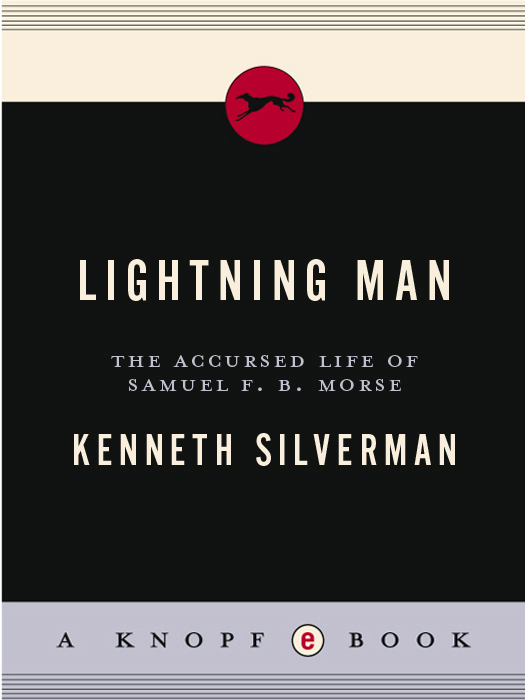
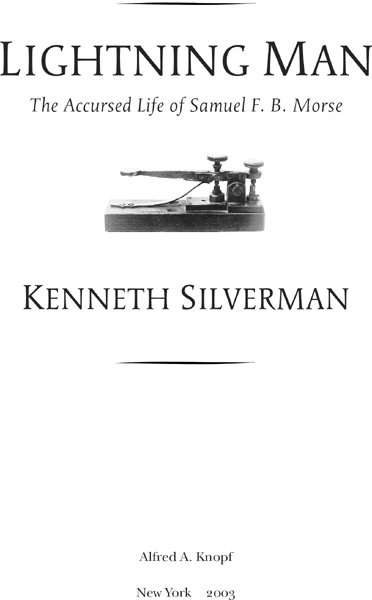
ALSO BY KENNETH SILVERMAN
HOUDINI!!!
Edgar A. Poe: Mournful and Never-ending Remembrance
The Life and Times of Cotton Mather
A Cultural History of the American Revolution
Timothy Dwight
For Benjamin Berkman and Eve Silverman

Contents

F INLEY
The value and rank of every art is in proportion to the mental labour employed in it, or the mental pleasure produced by it. As this principle is observed or neglected, our profession becomes either a liberal art, or a mechanical trade.
Sir Joshua Reynolds, Fourth Discourse on Art (1771)
We are a people essentially active. I may say we are preeminently so. Distance and difficulties are less to us than any people on earth. Our schemes and prospects extend every where and to every thing.
John C. Calhoun, speech in the U.S. Senate, June 24, 1812
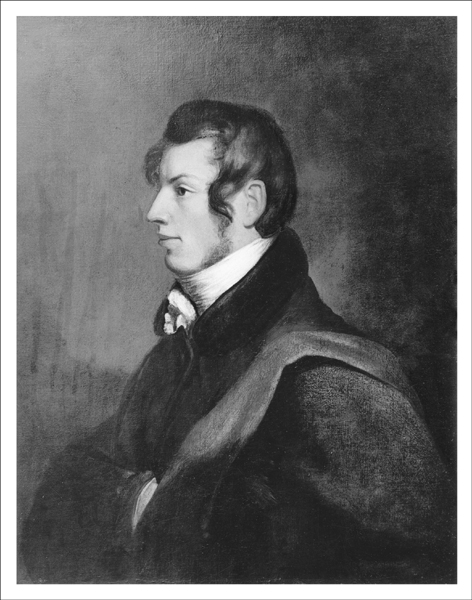
Samuel F. B. Morse, Self Portrait (18 12-13 ) (Addison Gallery of American Art)

(17891811)
O N APRIL 30, 1789, Jedediah Morse was installed as pastor of the First Congregational Church of Charlestown, Massachusetts. The occasion was triply significant to him. Twenty-seven years old, he had come to his vocation by study at Yale and graduate work in theology. He felt eager to promote the interests of religion but awed to contemplate the degenerate state of his fellow mortals, who every day crucified their Redeemer anew. The labor now to be undertaken by him was worthy but daunting, a good work, he said, but alas who is sufficient for these things.
The place mattered to Jedediah no less than the occasion. The First Church was one of the oldest in America, a fit pulpit for a man whose ancestors had emigrated to the New World in 1635, among the first settlers of Puritan New England. The church stood, too, in the shadow of Bunkers Hill. Just fourteen years earlier, armed provincials had defended the hill against three assaults by British infantry and marines.
And for Jedediah, the date was no less symbolic than the place. On the same day, on the balcony of New York Citys Federal Hall, George Washington was inaugurated as the first President of the United States and called on the new nation to preserve the sacred fire of liberty. Jedediah revered him as an epitome of republican virtueself-sacrificing, pious, restrained, great because he was good, indeed, Jedediah said, the greatest Man alive.
Two weeks after the momentous day of his settlement, Jedediah married twenty-three-year-old Elizabeth Finley, a granddaughter of the president of Princeton College. In appearance they were unlike, to judge from a later family portrait: Jedediah tall, slender, old-fashioned-looking in his knee breeches and black silk stockings; Elizabeth stoutish, buxom, jowlyno dwarf, she said of herself. Their personalities differed, too. Jedediahs well-bred manner and sweet voice set him off from his wifes no-nonsense practicality and tart wit. Just the same they made a close, affectionate couple. In letters home he addressed her as My dearest Life & Love. He borrowed the salutation, he explained, from a letter of George Washington to Martha Washington: as he is an excellent pattern in almost everything, so in this I would imitate him, believing that my Love for you is as great as his for Mrs. W.
On April 27, 1791, two years after marrying, the couple had their first child, a son whom they named after Elizabeths father and grandfather: Samuel Finley Breese Morse. Finley, as the family called him, spent his first seven years in the parsonage, a two-story wooden building near the First Church. The household included a pious Baptist servant-nurse, Nancy Shepherd. For a time, a black boy named Abraham also lived with the family, tending the horse and cow. Jedediah ministered to the black population of nearby Boston and publicly condemned the slave trade as inconsistent with republican principles.
Few details of Finleys early childhood remain. When about a year and a half old he contracted smallpox during an epidemic that struck a thousand people in Boston. At the age of four he began attending a dame school near the parsonage. Nancy Shepherd sometimes took him to Bunkers Hill and recounted its historic battle, which she had witnessed.
During the first ten years of their marriage Jedediah and Elizabeth had six more children. Only two survived, Finleys younger brothers Richard and Sidney. In the same period Jedediah became a national figure. While writing sermons and preaching about mankinds fallen state, he issued atlases, school texts, and travel guides with such titles as The American Universal Geography (1793) and The American Gazeteer (1797). He put the books to press, arranged for British editions, looked after sales and distribution, each year publishing a new geography or revision of some earlier one.
Jedediahs geographies became second in popularity only to Noah Websters spelling books and the Bible. Producing them put him in touch with notable men at home and abroad. He dined in Philadelphia with Benjamin Franklin and at Mount Vernon with George and Martha Washington. His many, far-flung correspondents included John Adams; the Bishop of London; and the French foreign minister, Talleyrand, who also visited him in Charlestown. His publications brought him an honorary degree from the University of Edinburgh and fame as Americas pre-eminent geographer. He did not hide his renown. On the title page of American Universal Geography he identified himself as a Doctor of Divinity, Fellow of the American Antiquarian Society, and Fellow of the Historical Societyas Jedediah Morse, D.D.F.A.A.S.H.S.
Jedediah became prominent in political life as well. Like the rest of the Congregationalist clergy he allied himself with the Federalist party. Against the more liberal, capitalistic social order taking shape in the wake of the American Revolution, he upheld the Calvinistic faith of his New England forebears, whose piety and sense of human dependence on God he considered essential to republican life. He hoped that the new United States would be left to itself, kept out of the Whirlpool of European Politicks. But there was no insulating the country from the long war for supremacy between Great Britain and Napoleons France. As the eighteenth century closed, Jedediah like most other Federalists viewed with growing alarm French interference in American affairs: use of American seaports as bases for privateering, attempted bribes to American envoys, manipulation of the American pressespecially the export to America of deism, skepticism, Voltairean atheism, and other forms of French Infidelity.
Such ominous political-religious issues brought out a combative side of Jedediahs personality, at odds with his usual mildness. He fought the French Antichrist from his historic pulpit, raging against France as the destroyer of nations that had enslaved millions and now menaced the independence of the United States. He sermonized against all the other enemies of Christian Republicanism as well: Masons, Illuminists, Roman Catholicsthe last being not Christians but idolators, with a libertine priesthood. All were leagued with the French Imperium, Jedediah warned, in trying to foment revolution in America and ultimately seize the country.
Font size:
Interval:
Bookmark:
Similar books «Lightning Man: The Accursed Life Of Samuel F. B. Morse»
Look at similar books to Lightning Man: The Accursed Life Of Samuel F. B. Morse. We have selected literature similar in name and meaning in the hope of providing readers with more options to find new, interesting, not yet read works.
Discussion, reviews of the book Lightning Man: The Accursed Life Of Samuel F. B. Morse and just readers' own opinions. Leave your comments, write what you think about the work, its meaning or the main characters. Specify what exactly you liked and what you didn't like, and why you think so.

